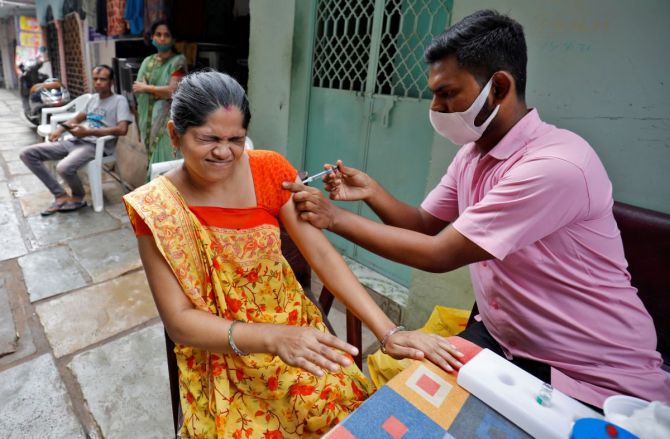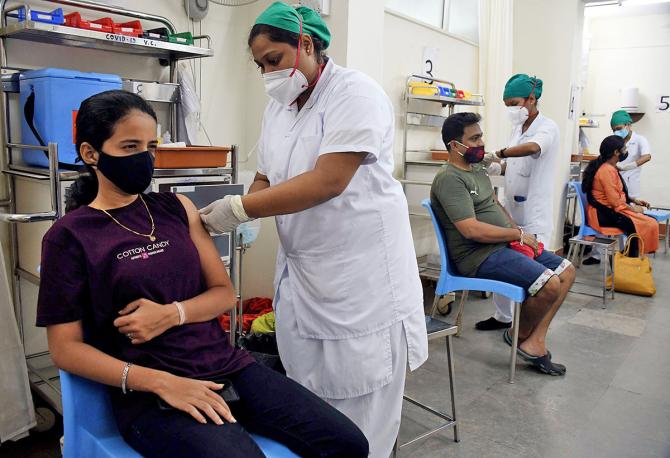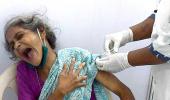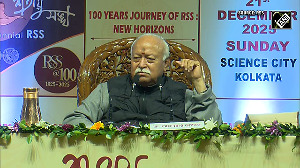'Between its natural immunity with Delta, in so many populations, and then getting on top of the vaccination (situation), I do not think India is going to have another bad wave.'

Dr Monica Gandhi, in the final part of her interview to Rediff.com's Vaihayasi Pande Daniel, offers three pieces of very hopeful news!
1. If you are vaccinated and continue to mask, properly please, even if you bump smack into someone majorly sick with COVID-19 -- given that your mask is still a piece of fibre -- your chances of getting a bad case of the disease are slim.
2. The Delta variant, because it has shown itself to be so horrifyingly transmissible and also so viciously virulent, might be the worst variant that SARS-CoV-II can spin off. Ie the worst poisonous arrow in its quiver. After this, the next mutations should be less harmful.
3. India might not have a third wave.
A professor of medicine and specialist in infectious diseases at University of California San Francisco, Dr Gandhi has been committedly and energetically focusing nearly full time on COVID-19 since the pandemic began.
Read on...
- Part I: 'Immunity will get us through Covid'
- Part II: 'When virus is still circulating, older people are more at risk'

I read with great interest about your research on masks. Though the right mask is 95 per cent effective, you discovered that, if and when viral particles pass through the mask. one could get a lower viral load of the COVID-19 virus, if one was adequately masked?
It was actually a hypothesis that we posed that has gained more and more evidence over time.
The hypothesis that we posed, back in September 2020, in a New England Journal of Medicine article, was that masks lower the (viral) inoculum (the initial dose of virus that a person takes in) to which you're exposed.
And (if it is lower) that leads to less severe disease, if you do get infected. That was based on other principles in animal biology, that the less virus you get, the less likely you are to have severe disease.
Then the hypothesis sort of gained (momentum), in the sense that, there are lots of masking studies, including one in Hong Kong now, the Bangladesh Mask RCT (randomised control trial) that shows that there's less symptomatic COVID-19 associated with mask wearing. It goes along with that hypothesis that you're reducing the symptoms that you get.
Then there was an NIH (National Institutes of Health, an agency of the US government working on medical and public health research) study that was published on February 12 -- or at least they put out a press release on February 12, 2021 -- that postulated that they agreed with this, that it brings less severe disease.
But they also thought it could be because of the humidity behind the mask. The virus doesn't get sort of broken down by that humidity, and it doesn't go down into the lungs. Maybe that's why you have less severe disease.
We don't know all the reasons, but it has gained more and more evidence, or at least observational evidence, that masks reduce the severity of disease.
I have been a very big proponent of masks.
Now, again, I live in a country where it's extremely controversial and I supported the CDC (Centers for Disease Control and Prevention, a US government health protection agency) decision to take off masks for the vaccinated, even though I didn't think that was the right idea. I had actually written that we should take it off for everyone at once.
But I thought that (the CDC decision) was going to be a motivator for people to get vaccinated, which it was temporarily, but then the motivation didn't last very long (laughs).
I wrote a Washington Post article supporting their (the CDC's) decision, sort of publicly, which was surprising for people, because I was such a proponent of the mask. But the reason I did that was I was thinking about human behaviour, and I thought: 'Okay, this is what's gonna get the people vaccinated'.
And then I was very disappointed (laughs) when we stayed low in our vaccination (rates). And then I supported the CDC (stand of) putting back masks in July.

Since maybe we are seeing, perhaps, the start of a pushback against COVID-19, is there enough emphasis now on what needs to be done for long COVID-19? Of course, data on long COVID is still coming in, bit by bit. But do you think that a lot more work has to been done towards solving long COVID?
Yes, actually, I do.
What's heartening news, in terms of the endemicity* question, is that when people get breakthrough infections (in spite of vaccines), there is a Lancet article that showed that there have been much lower rates of getting long COVID after a breakthrough, as opposed to being unvaccinated and getting natural infection.
When we think about endemicity, and it (COVID-19) turning into (something like) a cold, hopefully, for those who have adaptive immunity, that will not lead to longer symptoms.
For those, who are suffering from long COVID, who had a natural infection, yes, we need a lot more research.
The one thing I will say is that the NIH just announced, actually, they just gave out a huge number of grants. I'm trying to remember the number, but it's something to the tune of $400 million for studying long COVID-19. Actually, a group at our university got one of those grants.
It's not advertised that much -- how the US government is responding to it, and are concerned about it. But the way they're responding to it is through the NIH and through research.
Not really through policy, because it's unclear what to do policy wise. It's more that they are responding through trying to study it, research, treatments, fluvoxamine and other ways to relieve the symptoms.

India is looking at a pronounced lull in COVID-19 cases.
What do you think of this lull? Does it mean that there may be another larger wave? What does it look like to you?
I have thought about India a lot actually -- being Indian American, and just having really, really seen what happened during Delta, which was so terrible.
I will say -- which is what I was talking about earlier -- that the Delta variant leads to a lot of immunity, because it finds people. That was really illustrated in India. It found a lot of people. And it found a lot of people who got really sick. And some who got more mild disease, and then got immunity.
I do think there's probably a lot of immunity, at least among the populations where the Delta variant was circulating at the time.
Then the other thing that I'm hearing, and seeing, is that there are higher rates of vaccination among those who were able to stay at home, ie the upper middle class.
And that India is working pretty hard on the vaccination right now, with Covaxin, Covishield and Sputnik V vaccine, which is priced at like Rs 1,400, I think, and then the Novavax coming in probably October, which they are going to call Covovax.
Actually, between its natural immunity with Delta, in so many populations, and then getting on top of the vaccination (situation), I do not think India is going to have another bad wave.
They have to get people that keep up their vaccination and keep up their emphasis on that. But after such a terrible thing that happened, I do think that the emphasis is there.

You had mentioned, in that same article to The Washington Post, that the virus will eventually mutate into something milder soon. There's no sign of that yet.
What can ruin the happening of the endgame for COVID-19 in the world, apart from all these people who don't want to vaccinate, those doing stupid things, and the variants?
The thing about viral evolutionary biology is that where a virus mutates to is usually to become more transmissible. That's a very evolutionary biology (strategy) for viruses, because it wants to become more transmissible. It wants to make more copies of itself. That is what evolution does.
There's no virus in history that has ever continually evolved to become more virulent and kill more and more people.
I'm just of going on history and principles of evolutionary biology, (when I say) that if you look at viral biology, as a virus mutates and keeps on mutating and keeps on transmitting, it is eventually at a cost for itself, and that cost is likely to be that it becomes more weak.
So, this is sort of history. I am not sure, but it is my prediction that it's not going to keep on getting more virulent and more transmissible. I don't think we can have a more transmissible virulent virus. This Delta variant is sort of a pinnacle of that.
I'm hopeful that it's not going to keep on going. I think this is a kind of viral end. This is the virus to end it.
Not end. I know that sounds too positive. It is so crazily transmissible. Serology rates are so high in unchecked populations. And because of that, I genuinely feel it can't get worse.
 IMAGE: Dr Monica Gandhi. Photograph: Kind courtesy Dr Monica Gandhi
IMAGE: Dr Monica Gandhi. Photograph: Kind courtesy Dr Monica GandhiSo, it's just a matter of time?
I don't think it can get worse than this. It got bad. Delta is bad. I don't think it can get worse than this.
You're saying it's just a matter of time -- and you can't predict the period of time -- but it has to follow a viral behaviour?
Yes. Evolutionary behaviour. Exactly.
*A disease which is prevalent but something one can live with because it is not causing extensive harm.
Feature Presentation: Aslam Hunani/Rediff.com










